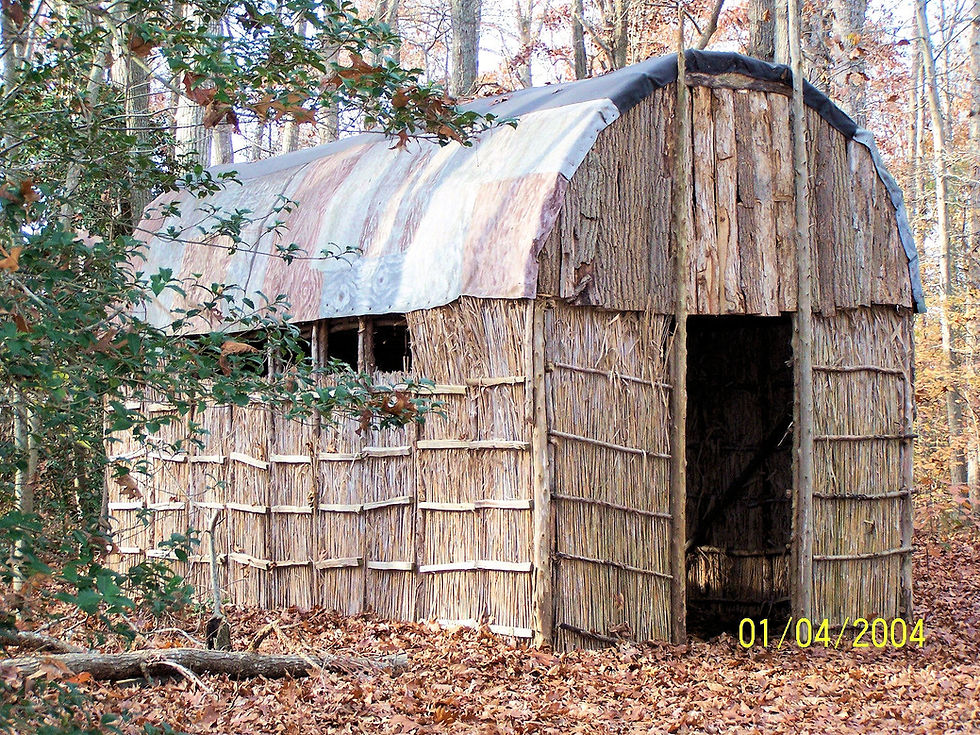Native American Lodge Repaired
- Paul Layton

- Jan 28, 2022
- 4 min read

If you have spent any time walking the various Nature Preserve properties, sooner
or later you will stumble onto the Native American lodge replica in the Lindale
tract forest. This structure has been used for decades as teaching aid for Native
American studies. Literally thousands of schoolchildren, as well as adults, have
benefitted from programs given by the Delaware Nature Society. This article
should help you understand a little of how the lodge came to be and some recent
repairs.
Sussex County, Delaware was populated by various groups of Native Americans
during different periods of history. It was decided by the Abbott’s Mill Nature
Center staff at the time to build a replica lodge to more clearly illustrate the
Native American lifestyle. The plan I used was based on the first contact painting
of John White c. 1585.

Although the Roanoke people he was documenting lived on the Northeast coast
of present-day North Carolina, his paintings give us the most accurate depiction of
the construction details of early coastal people. It was decided that our lodge
would use natural materials as much as possible and be of the same scale. A later
article will give a more detailed account of the actual construction.
The materials used were red cedar, red maple, white cedar, and phragmites
rushes. They have survived surprisingly well through all kinds of weather
including the devastating ice storm of 1994, numerous hurricanes, wind, and golf-
ball sized hail that broke windshields, house siding, and dented car roofs.


When the lodge was first completed in April 1993, naturally the surrounding trees
were much smaller and did not pose a serious threat. Just recently I met a lady
with her family at the lodge who told me she had been hiking to the lodge for 27
years, beginning as a third grade Milford School student, then college, marriage,
and now motherhood.
Personally, I was the first person to stay overnight in the lodge in April 1993. I
had a restless night due to the endless honking of the Canada geese setting up
territories on the adjacent millpond. Then, in the wee hours of the morning, I was
disturbed by a rustling in the leaves and rushes outside and paid a visit by a
striped skunk. Actually, the lodge has been lived in on two occasions that I’m
aware of. First, a pair of runaway teens one winter until thankfully discovered,
and more recently by a pair of black vultures in the summer 2021. The Nature
Center staff cordoned the area off until the vultures completed their nesting
cycle.

The frequent windstorms of 2021 took down a large oak limb that fell onto the
front section nearest the doorway and crushed several framing bows. The roof
frames are made up of semi-circular bows of bent saplings spaced 24 inches
apart.


The first three sections were broken as well as the front, south corner
post. After some discussion it was decided to jack the roof back up to the original
height, as much as possible, and to replace the broken framing poles with new
material.


These repair materials were cut on our farm and hauled to the site. The work was
done by Elliott Workman, Mike Rivera, Steve Childers, and myself. There are still
a few finishing details to be done before the work is entirely complete. The new
bark slabs above the doorway need to be hung and the phragmites rushes need
to be replaced. The rushes are gathered in winter after the leaves have fallen.
Hopefully, that work can be completed soon.


Additional preventive maintenance done was the removal of one dying black oak
(Quercus vellutina) that posed a danger not only to the lodge but hikers as well.
That work was done by Nature Society staff Dave Pro and James White, Jr. The
high, dangerous, overhanging oak limb at the rear of the lodge required
professional attention by A+ Tree Service for safe removal.



The lodge has not only served in the education of thousands of school children,
but it has also served as to test the durability of the components used. Over the
years the phragmites have been replaced three or four times. The original
horizontal red maple tie sticks that hold the thatch in place, were replaced with
rot resistant Atlantic white cedar. The roof material, painted to look like bark, has
been punctured and patched. A second layer of roofing was added to the center
portion. The burlap covering the inside of the vaulted ceiling, has suffered some
damage by squirrels that seem to think it would serve better as a lining for their
nests. Carolina wrens have built nests under the protection of the roof, too.


Hopefully after the current repairs are completed, the lodge will be enjoyed for
years to come.

Why don’t you take a walk in the Lindale Woods? Enjoy the pondside trail, the
birds, the trees, and the lodge. Happy Hiking!
All photos by the author
Note: the Lindale Woods are directly across Abbotts Pond Road from the Abbotts Mill Nature Center. The trailhead is about a third of a mile from the road.


https://usa.linkman.be/
https://usa.sceneone.nl/
https://usa.rosadoc.be/
https://usa.eurolines.nl/
https://usa.worldconnection.nl/
https://usa.kompasoutdoor.nl
https://usa.de-vitrine.be/
https://usa.zibb.nl/
A home gives us and our family a sense of security and safety. It is important that the home itself is strong enough to protect its inhabitants. Always hire roof repair miami experts for any type of issue regarding roof.